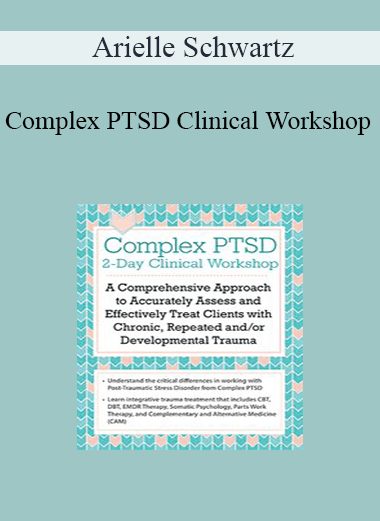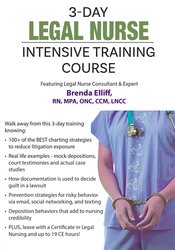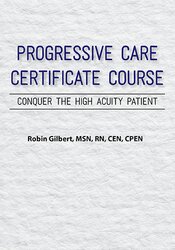Buy Arielle Schwartz – Complex PTSD Clinical Workshop: A Comprehensive Approach to Accurately Assess and Effectively Treat Clients with Chronic, Repeated and/or Developmental Trauma Course at GBesy. We actively participate in Groupbuys and are committed to sharing knowledge with a wider audience. Rest assured, the quality of our courses matches that of the original sale page. If you prefer, you can also buy directly from the sale page at the full price (the SALEPAGE link is directly provided in the post).
 [Instant Download] – Immediately deliver the download link after receiving the payment
[Instant Download] – Immediately deliver the download link after receiving the payment
Arielle Schwartz – Complex PTSD Clinical Workshop: A Comprehensive Approach to Accurately Assess and Effectively Treat Clients with Chronic, Repeated and/or Developmental Trauma course with special price just for you: $439.99 $83
- Faculty:
- Arielle Schwartz
- Duration:
- 12 Hours 20 Minutes
- Format:
- Audio and Video
- Copyright:
- Oct 23, 2018
Description
In this recording, Dr. Arielle Schwartz will show you an engaging and interactive way to learn valuable strategies that will allow you to successfully address the dysregulated affect and arousal states that accompany Complex PTSD. You will leave this seminar with practical tools that facilitate a strength-based approach to trauma recovery and increased resilience in clients.
Handouts
| Manual – Complex PTSD 2-Day Clinical Workshop (2.33 MB) | 96 Pages | Available after Purchase |
Outline
Post-Traumatic Stress Disorder vs. Complex PTSD: Understand the Difference
- Acute traumatic stress, PTSD, Complex PTSD
- Diagnostic clarification and differential diagnosis
- Key contributing factors of Complex PTSD
- The common symptoms of Complex PTSD
The Neurobiology of PTSD: Beyond Fight and Flight
- Polyvagal Theory
- 6 Stages of trauma response
- Heart Rate Variability and the Social Nervous System
- Interpersonal Neurobiology
- Psychobiological regulation
- Rupture and repair
- Implications of childhood neglect or abuse
- Neuroplasticity and Complex PTSD
Psychological and Physiological Repercussions of Complex PTSD: A Deeper Understanding for Accurate Assessment
- Intrusive symptoms and anxiety
- Emotional dysregulation: Outbursts of anger and debilitating shame
- Avoidance symptoms and phobic reactions to traumatic material
- Interpersonal problems and difficulty being close to others
- Dissociation and dysregulation
- Cognitive distortions and compromised meaning making
- Physical health problems, ACE factors and painful somatization
- Preverbal and nonverbal memories
- Disturbing somatic sensations
- Depressive symptoms
- Learned helplessness and shame
Therapeutic Interventions for Complex PTSD: Summary of Effective Therapies
- Psychodynamic and Relational Therapy
- Psychobiological perspectives: Polyvagal Theory
- Cognitive Behavioral Therapy (CBT)
- Dialectical Behavioral Therapy (DBT)
- EMDR Therapy
- Somatic Psychology
- Parts Work Therapy: Work with Ego States
- Complementary and Alternative Medicine (CAM): mindfulness, yoga, and integrative healthcare
Integrative Treatment for Complex PTSD: Putting it All Together for an Effective Treatment Plan
- A biopsychosocial approach: Partner with clients to build a health care team
- Goal of treatment: Memory retrieval vs. trauma recovery
- History taking: Identify chronic, repeated, and/or developmental trauma events
- Cultural factors and Complex PTSD
- Recognize attachment Injuries
- How to work with transgenerational trauma
- Identify parts, ego states and defenses
- Assess for dissociation
- Mutual regulation and relational repair in therapy
- Prepare for trauma processing: Develop resources and stability
- Work through traumatic memories: EMDR and Somatic Psychology
- Grief work in Complex PTSD
- Integrate and Instill positive change
Experiential Interventions: Mind-Body Practices for Clients with Complex PTSD
- Conscious breathing for self-regulation
- Grounding and sensory awareness
- Containment: Reclaim choice and control
- Build imaginal allies
- Cultivate mindfulness, acceptance, and self-compassion
- Somatic interventions: Titration, sequencing, and somatic re-patterning
- Bilateral stimulation and dual attention in EMDR Therapy
- Potential risks and limitations of mind-body therapies
Fostering Resilience: For Post-Traumatic Growth and Healing
- Learn the 6 Pillars of Resilience
- Trauma recovery and the bell curve
- Resilience as a process and an outcome
- Help clients move from learned helplessness to learned optimism
- Post-Traumatic Growth: Help clients reach their potential
Vicarious Trauma: Improve Client Outcomes Through Effective Self-Care
- Identify resources that improve your clinical skills
- In-session self-care to improve focus on the client and therapeutic process
- Burnout prevention techniques
Please Note: PESI is not affiliated or associated with Marsha M. Linehan, PhD, ABPP, or her organizations.
Faculty
Arielle Schwartz, PhD Related seminars and products: 3
Arielle Schwartz, PhD, is a licensed clinical psychologist, Certified Complex Trauma Professional (CCTP-II) and EMDR consultant with a private practice in Boulder, Colorado. She is the co-author of EMDR Therapy and Somatic Psychology: Interventions to Enhance Embodiment in Trauma Treatment (Schwartz & Malberger, 2018, W.W. Norton) and the author of The Complex PTSD Workbook: A Mind-Body Approach to Regaining Emotional Control and Becoming Whole (Schwartz 2016, Althea Press).
Dr. Schwartz is an international presenter on EMDR therapy, somatic psychology, complex PTSD, attachment trauma, and the psychological treatment of chronic pain. She is a certified Kripalu yoga instructor offering therapeutic yoga for trauma recovery. Her integrative approach to therapy includes the synthesis of somatic psychology, EMDR therapy, structural integration theory, existential therapy, and Gestalt – all with a strong relational foundation of care.
Speaker Disclosures:
Financial: Arielle Schwartz is in private practice. She is an author for W.W. Norton and receives royalties. Dr. Schwartz receives a speaking honorarium from PESI, Inc.
Non-financial: Arielle Schwartz is a member of American Psychological Association (APA); EMDR International Association (EMDRIA); and Colorado Association of Psychotherapists (CAP).
Arielle Schwartz|Arielle Schwartz – Complex PTSD Clinical Workshop: A Comprehensive Approach to Accurately Assess and Effectively Treat Clients with Chronic|Complex PTSD Clinical Workshop: A Comprehensive Approach to Accurately Assess and Effectively Treat Clients with Chronic|Repeated and/or Developmental Trauma
Buy the Arielle Schwartz – Complex PTSD Clinical Workshop: A Comprehensive Approach to Accurately Assess and Effectively Treat Clients with Chronic, Repeated and/or Developmental Trauma course at the best price at GBesy.. After your purchase, you will get access to the downloads page. You can download all the files associated in your order at here and we will also send a download notification email via your mail.
Unlock your full potential with Arielle Schwartz – Complex PTSD Clinical Workshop: A Comprehensive Approach to Accurately Assess and Effectively Treat Clients with Chronic, Repeated and/or Developmental Trauma courses. our courses are designed to help you excel.
Why wait? Take the first step towards greatness by purchasing Arielle Schwartz – Complex PTSD Clinical Workshop: A Comprehensive Approach to Accurately Assess and Effectively Treat Clients with Chronic, Repeated and/or Developmental Trauma courses today. We offer a seamless and secure purchasing experience, ensuring your peace of mind. With our trusted payment gateways, Stripe and PayPal, you can confidently complete your transaction knowing that your financial information is protected.
Stripe, known for its robust security measures, provides a safe and reliable payment process. With its encrypted technology, your sensitive data remains confidential throughout the transaction. Rest assured that your purchase is protected.
PayPal, a globally recognized payment platform, offers an additional layer of security. With its buyer protection program, you can feel confident in your purchase. PayPal ensures that your financial details are safeguarded, allowing you to focus on your learning journey.
Is it secure? to Use of?
- Your identity is completely confidential. We do not share your information with anyone. So it is absolutely safe to buy the Arielle Schwartz – Complex PTSD Clinical Workshop: A Comprehensive Approach to Accurately Assess and Effectively Treat Clients with Chronic, Repeated and/or Developmental Trauma course.
- 100% Safe Checkout Privateness coverage
- Communication and encryption of sensitive knowledge
- All card numbers are encrypted using AES at relaxation-256 and transmitting card numbers runs in a separate internet hosting atmosphere, and doesn’t share or save any data.
How can this course be delivered?
- After your successful payment this “Arielle Schwartz – Complex PTSD Clinical Workshop: A Comprehensive Approach to Accurately Assess and Effectively Treat Clients with Chronic, Repeated and/or Developmental Trauma course”, Most of the products will come to you immediately. But for some products were posted for offer. Please wait for our response, it might take a few hours due to the time zone difference.
- If this happens, please wait. The technical department will process the link shortly after. You will receive notifications directly by e-mail. We appreciate your wait.
What Shipping Methods Are Available?
- You will receive a download link in the invoice or YOUR ACCOUNT.
- The course link always exists. use your account to login and download the Arielle Schwartz – Complex PTSD Clinical Workshop: A Comprehensive Approach to Accurately Assess and Effectively Treat Clients with Chronic, Repeated and/or Developmental Trauma course whenever you need.
- You only need to visit a single link, and you can get all the Arielle Schwartz – Complex PTSD Clinical Workshop: A Comprehensive Approach to Accurately Assess and Effectively Treat Clients with Chronic, Repeated and/or Developmental Trauma course content at once.
- You can do your learning online. You can be downloaded for better results and can study anywhere on any device. Make sure your system does not sleep during the download.
How Do I Track Order?
- We always notice the status of your order immediately after your payment. After 7 days if there is no download link, the system will automatically complete your money.
- We love to hear from you. Please don’t hesitate to email us with any comments, questions and suggestions.
![GBesy [GB] GBesy [GB]](https://www.gbesy.com/wp-content/uploads/2023/05/gbesy-Logo-full-100.png)



 Purchase this course you will earn
Purchase this course you will earn 




Reviews
There are no reviews yet.